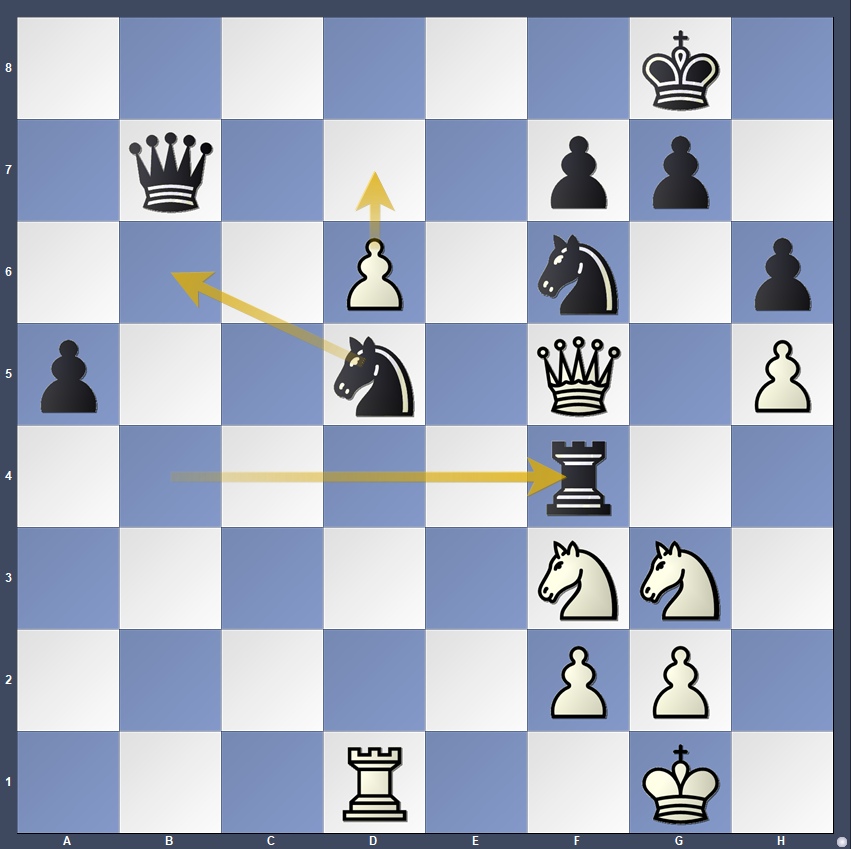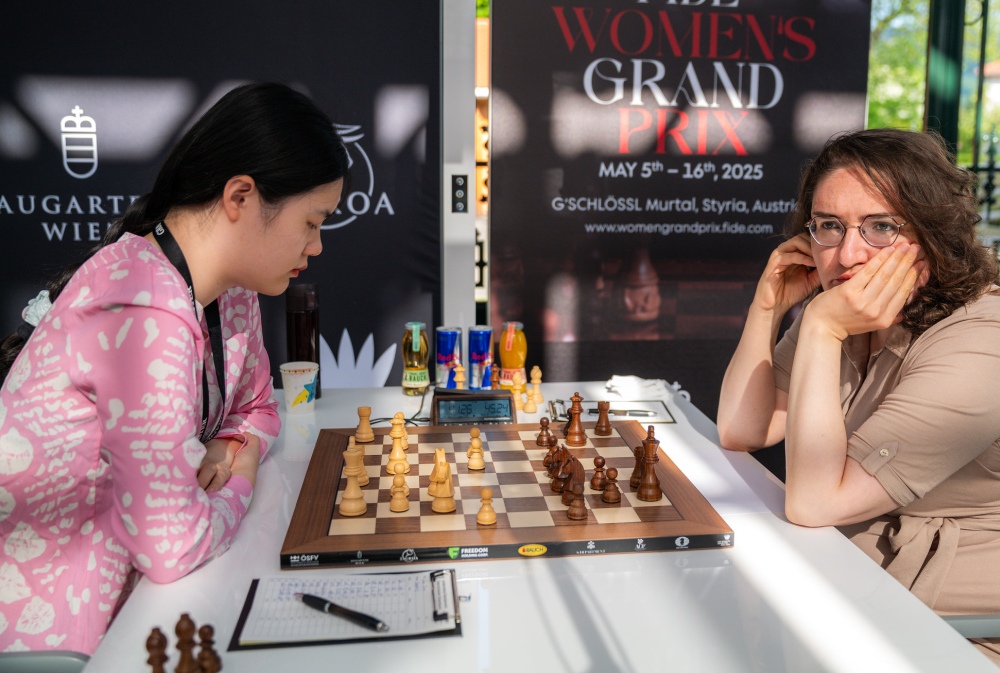
In a day of fast and sharp games, Zhu Jiner scored her fifth consecutive victory to tie for first place with Anna Muzychuk, who made a third draw in a row. Tan defeated Javakhishvili and is now half a point behind the leaders. Mariya Muzychuk pulled off her first victory in the tournament in a blunder-laden game against Olga Badelka.
Round seven of the final 2024/2025 Women’s Grand Prix leg delivered four decisive outcomes in under four hours, leaving just one draw.
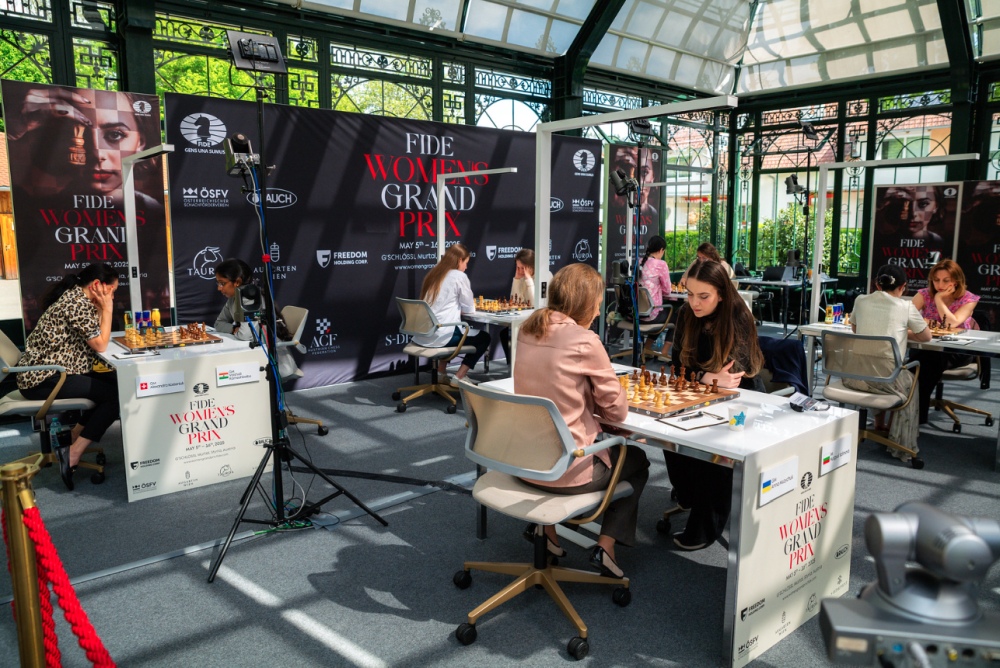
A blunder by Nana Dzagnidze helped Zhu Jiner secure a fifth consecutive victory, joining Anna Muzychuk at the top, on five points. Another Chinese player, former World Champion Tan Zhongyi, is just half a point behind, in striking distance. Vaishali is in fourth place, on four points. After a great start in the first part of the tournament (with two wins and two draws), she stumbled, making just one point out of the last three games.
Zhu and Anna Muzychuk are the only two players in this tournament who have a chance to win the overall Grand Prix series, and there are just two more rounds to go!
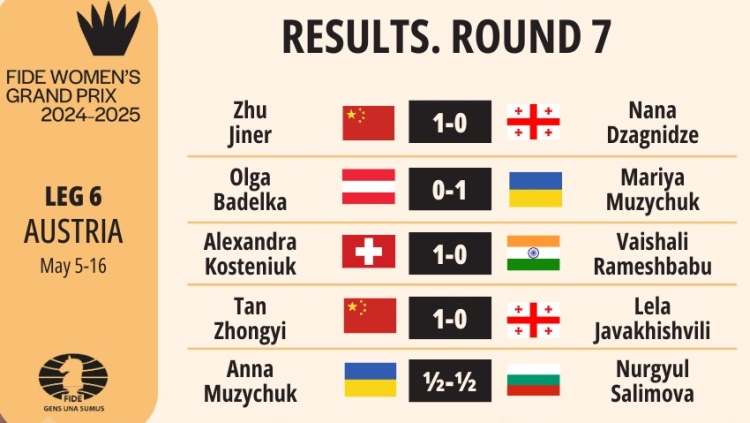
A look at the games of round seven
Zhu Jiner benefited from an oversight by Nana Dzagnidze, who blundered in an inferior position.
Nana made a serious inaccuracy on her previous move and here she had to give up her a-pawn – 35…Nb6 36.Qxa5 Nbd7 blocking White’s passer. Instead she played 35…Rf4? missing a refutation
36.d7! A perfect illustration of deflection! 36…Nxd7 37.Qxd5 and White is a knight up.
In another Nimzo-Indian, Vaishali ended in time trouble as Black against the great Alexandra Kosteniuk. The former Women’s World Champion surprised her opponent with 1.d4 – which she usually doesn’t play against Vaishali. “There are many first moves,” Kosteniuk said – “but the most important thing is not what you play but how you play.”
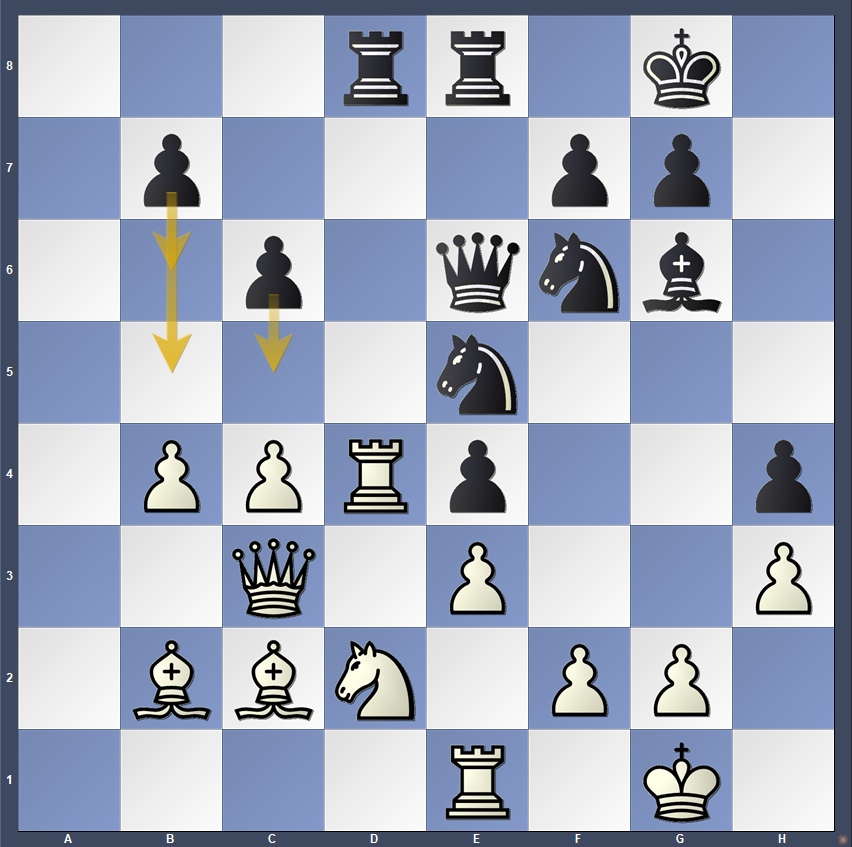
In this position, Black was in time trouble and under pressure.
23…c5?? Playing 23…b6 or …b5 with an exchange on the d-file was a much better option.
24.bxc5 Nc6 25.Rxe4!! Bxe4 Black cannot take with the knight because of mate on g7.
26.Nxe4 Ne5 27.Nd6! And now Black has to give up a rook on d6. She cannot play 27…Re7 because of 28.Bf5 and the queen is trapped. And if 27…Rf8 then Black loses the knight on e5.
A few moves later, Vaishali resigned.
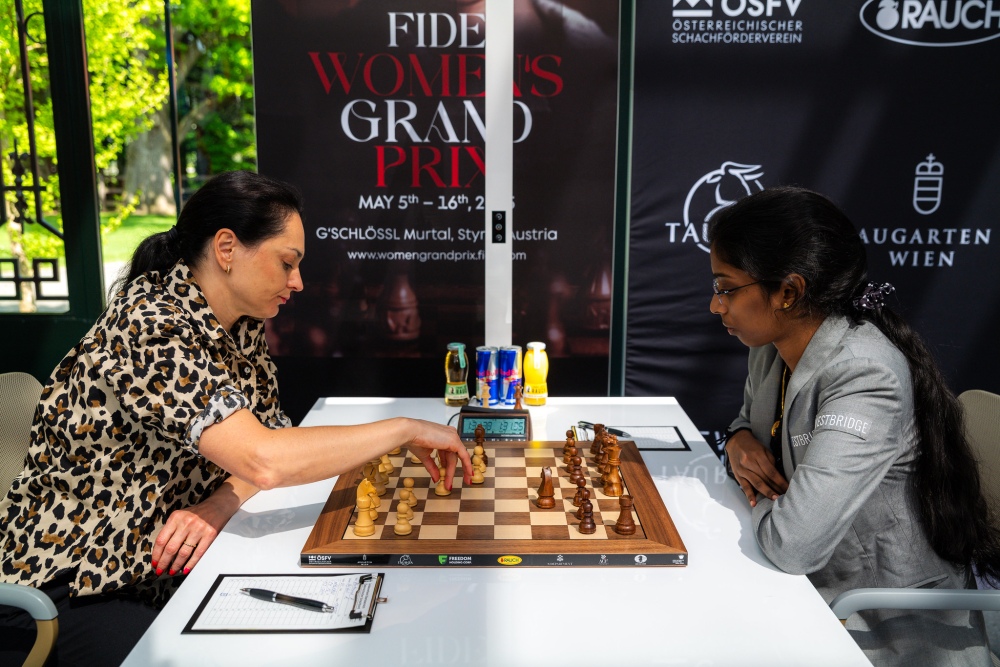
This was a second consecutive victory for Kosteniuk, and she now has 3.5 points. Though pleased with this victory, Kosteniuk expressed dissatisfaction with her overall performance. As she pointed out, “the quality of my games in this tournament is about 73-75 percent. And if my performance is below 90%, I think it’s very bad.”
The most dramatic or, rather, most chaotic game of the round was played between Olga Badelka and Mariya Muzychuk, where both traded grave errors in time trouble.
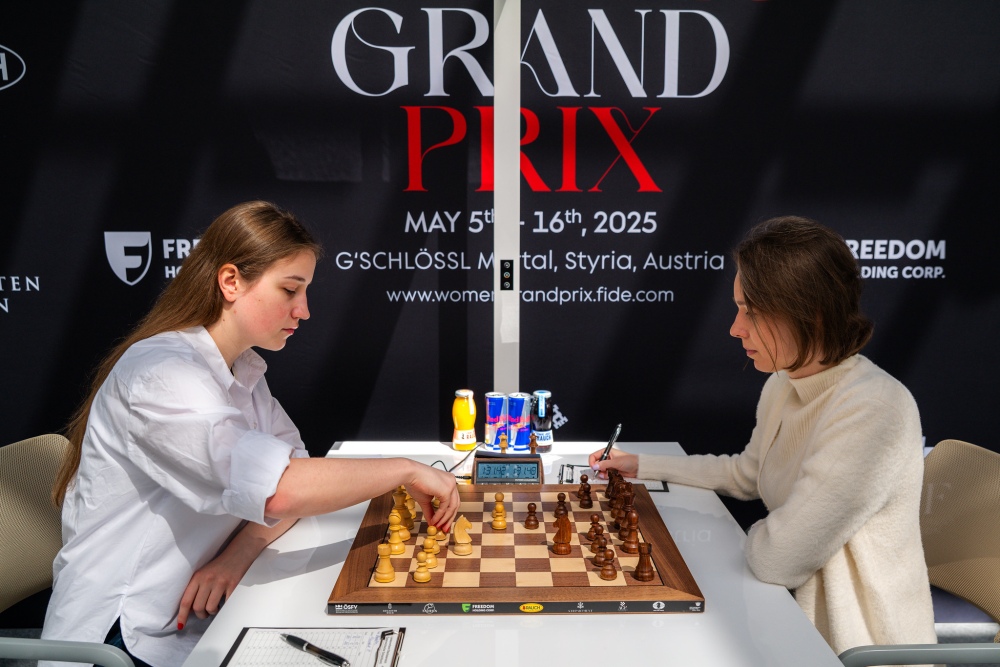
In the Slav Defence, former Women’s World Champion Mariya Muzychuk took a pawn in the centre that gave White an upper hand in development and a strong attack. However, Badelka did not find the best continuation and after a series of mutual inaccuracies by move 31, the position was sharp for both.
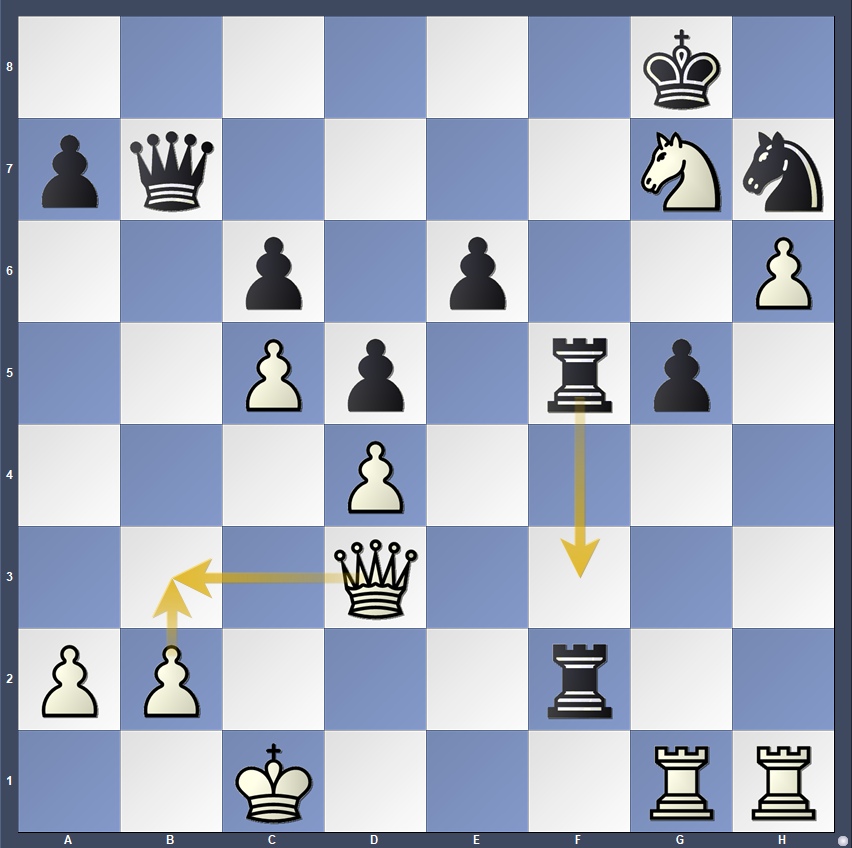
31…Qb7, threatening mate on b2. Instead of 32.Qb3 Badelka played the seemingly natural but losing move 32.b3. However, it fails to 32…R5f3! and now White is completely lost.
In time trouble, both traded mistakes, with the position swinging from a total victory for Black to a draw: 33.Qg6 Qf7 34.Qxe6 Rxa2 Black is better, but White has chances.
35.Qc8?? Blunder. Black is winning. 35…Qf8?? Now it’s equal.
36.Qe6+ Kh8 37.Qe5?? Black is now winning: 37…Rff2.
Soon the two reached the first time control and it was completely lost for White.
The first victory for Muzychuk in the tournament, who is now on 3/7. Badelka’s third consecutive loss leaves her on two points.
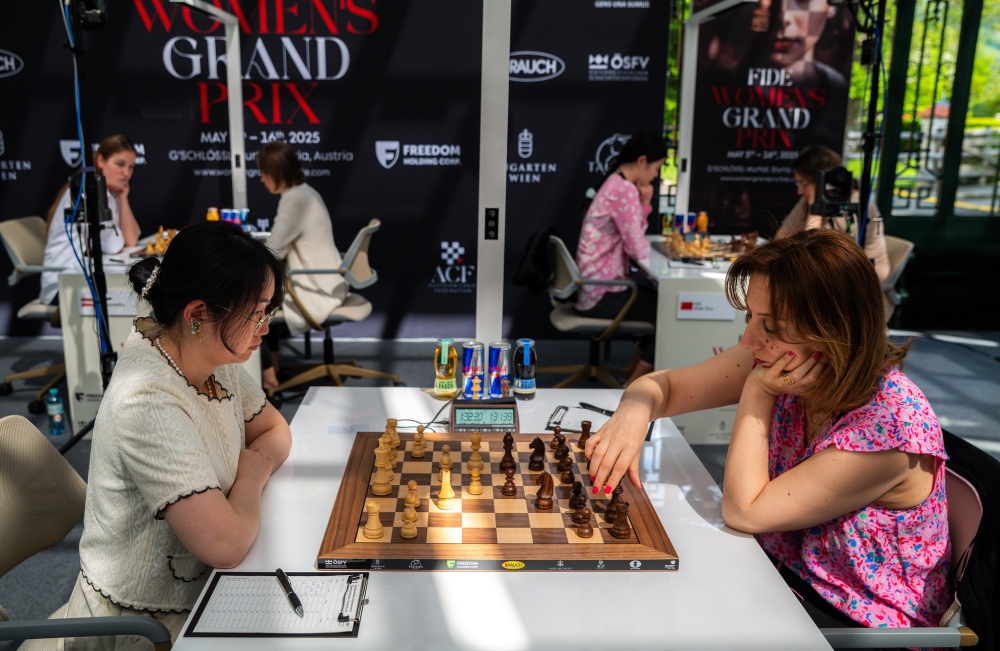
In the main line of the Giuoco Piano, China’s Tan Zhongyi and Lela Javakhishvili from Georgia followed well-known theory. But on move 17, Black made her first serious inaccuracy. White seized the initiative and emerged notably better. Soon, Black overlooked a pawn, and it was all over for her. Tan confidently converted her material advantage into a full point.
The only peaceful game of the day was between Anna Muzychuk and Nurgyul Salimova. In the Four Knights Game, the position was even throughout without much excitement. The two agreed to split a point after move 40. Anna Muzychuk has five points and is the only undefeated player in the tournament so far.
Standings after Round 7:
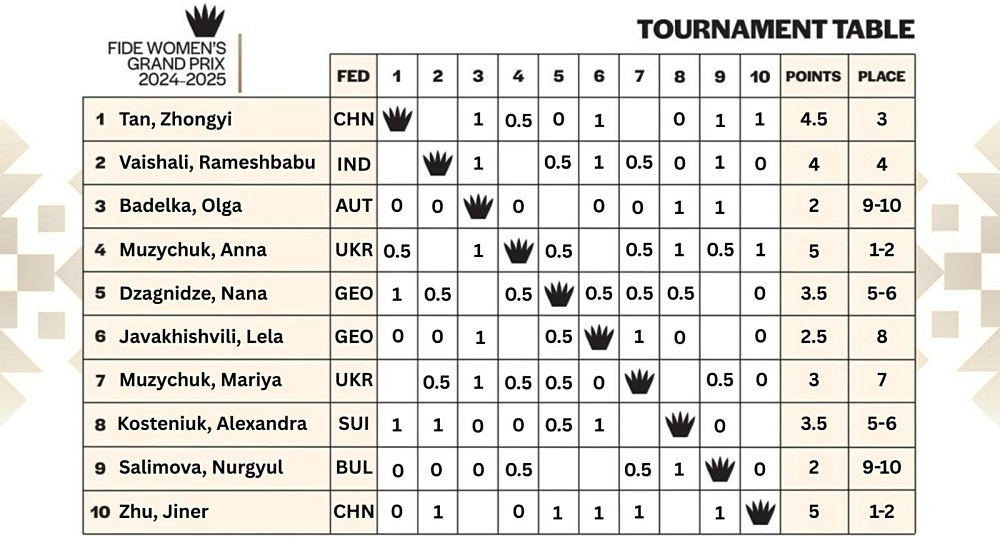
A rest day is not a no-chess day
On Monday, 12th May, during the rest day at the Women’s Grand Prix in G’Schlössl Murtal, a VIP event featured a blitz tournament and a challenge match against 15th World Champion Viswanathan Anand.
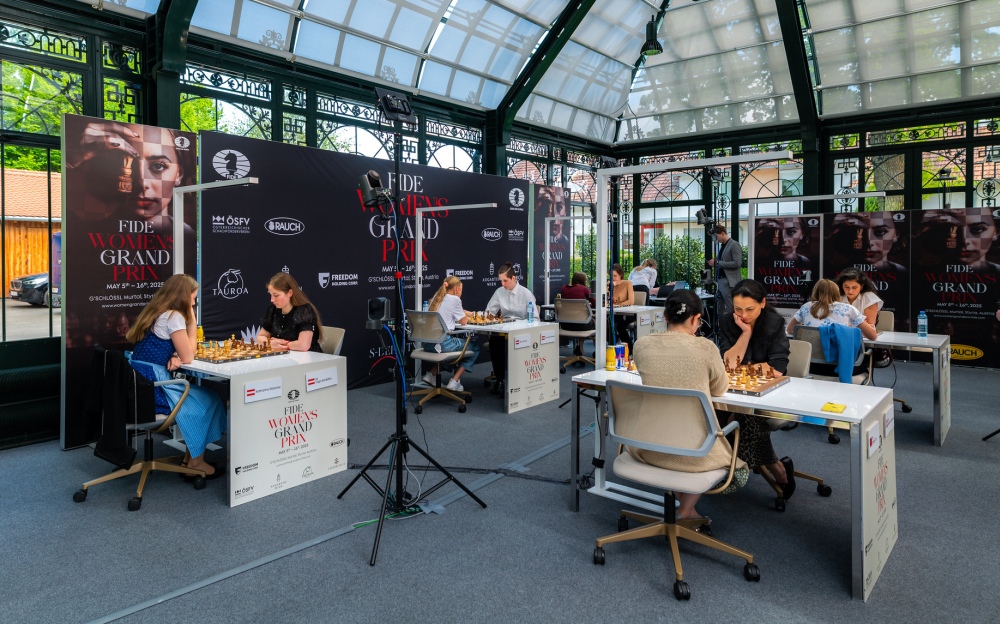
Alexandra Kosteniuk, Mariya Muzychuk, Tan Zhongyi, and Austria’s Olga Badelka faced six young Austrian talents, with all games won by the experienced Grand Prix players.
The youngsters then faced Anand one-on-one in a blitz challenge to see who could hold out longest. Katharina Pötscher lasted 55 moves for the day’s longest game, but it was Eva Maria Schmied who surprised everyone with a draw—winning two pawns and trapping Anand in perpetual check.
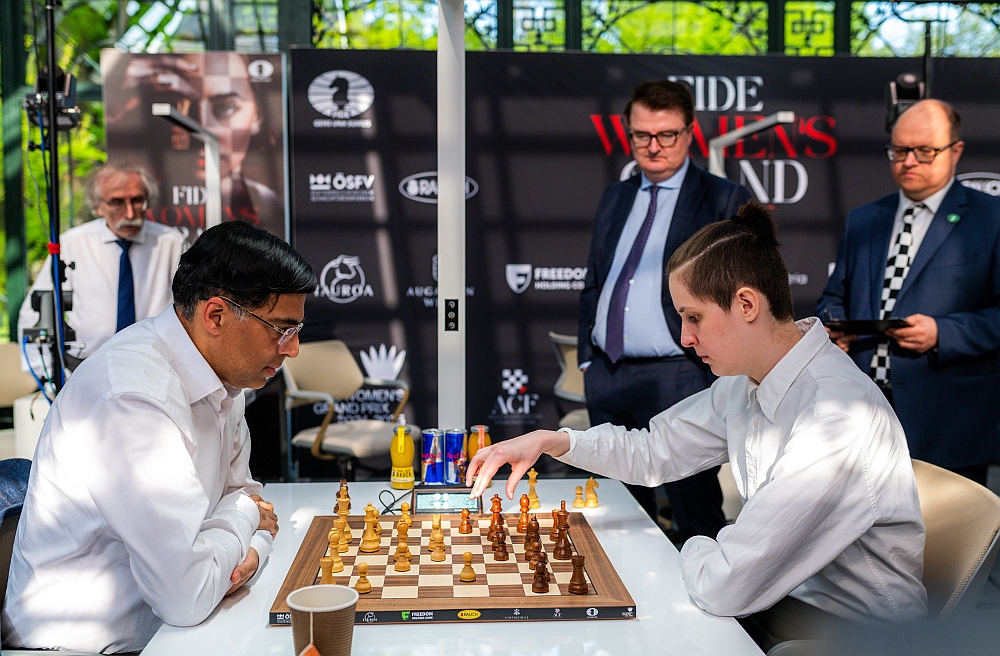
A gala dinner at the G’Schlössl Orangery closed the day, with players, FIDE officials, and guests gathering for the evening. Felix Blohberger’s historical chess puzzles set up on each table provided entertainment, as FIDE CEO Emil Sutovsky correctly identified all of the positions and their backstories.
Anand on India’s chess boom: Strong foundations and rising stars
During a live broadcast with Felix Blohberger, Indian chess legend Viswanathan Anand reflected on the remarkable rise of Indian chess, crediting the country’s structured support system and cultural acceptance of the game.
Anand highlighted the role of key regions – such as his home state Tamil Nadu, but also Pune, Kolkata and Mumbai in building chess expertise.
“We have excellent coaches… and I think the cultural acceptance is quite high, so a lot of parents like putting the kids in chess,” Anand noted, pointing to the combination of grassroots initiatives, school support, and state incentives that have created conditions for a thriving chess culture.
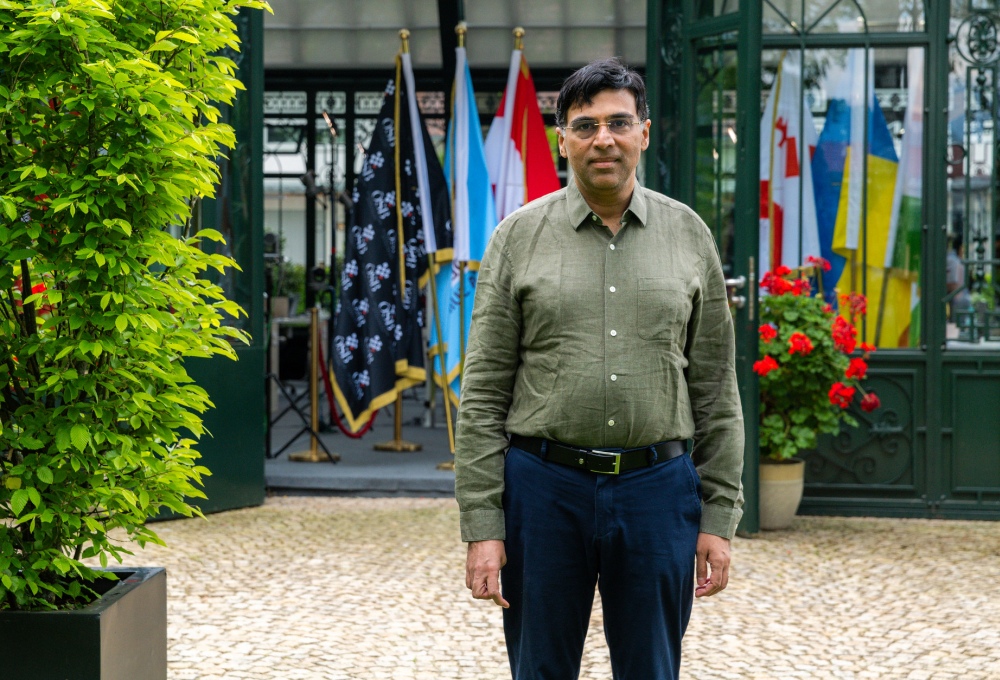
Speaking about the rise of young Indian talents such as Gukesh, Praggnanandhaa, and Arjun Erigaisi, Anand emphasised that “a lot of things came together” over time, resulting in India’s current generation of exceptionally strong players.
Turning to women’s chess, the five-time World Champion acknowledged the growing strength but also noted areas for improvement. “In women’s chess, we still need to see a bigger trend. I’d like to see more of them get into the game,” he said. Anand praised players like Humpy Koneru and Harika Dronavalli for their continued success but admitted “there’s still some way to go.”
Round 8 starts on Wednesday, May 14, at 3 PM CET
Round 8 pairings:
Nana Dzagnidze – Nurgyul Salimova
Lela Javakhishvili – Anna Muzychuk
Vaishali Rameshbabu – Tan Zhongyi
Mariya Muzychuk – Alexandra Kosteniuk
Zhu Jiner – Olga Badelka
Written by Milan Dinic
Photos: Przemysław Nikiel
About the tournament:
The tournament in Grosslobming is the final in a series of six tournaments in the 2024/2025 Women’s Grand Prix cycle.
Format: Ten players play a round-robin tournament (9 rounds). The time control is 90 minutes for the first 40 moves, followed by 30 minutes for the rest of the game, with an increment of 30 seconds per move starting from move 1.
Prize fund: €120,000 distributed among 10 participants based on placement (see Regulations)
For more information about the event, visit: womengrandprix.fide.com/
About the Women’s Grand Prix series
The FIDE Women’s Grand Prix (WGP) Series 2024–25 stands as a premier series in the international women’s chess calendar. In its seventh season, it serves as one of the crucial pathways to the Candidates.
The event comprises six tournaments, hosted in different countries: Georgia, Kazakhstan, Monaco, Cyprus, India and Austria.
The scoring system is conceptualised in a way that favours not just tournament victories, but consistency across events. Each player has a right to play in three out of the six events in the series.
The event is part of FIDE’s World Championship cycle, and the top two players in the WGP will qualify for the 2026 Candidates tournament. The winner of the Candidates will become the challenger to the current Women’s World Champion Ju Wenjun, who successfully defended her title against Tan Zhongyi in their 2025 match.



